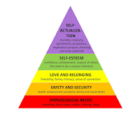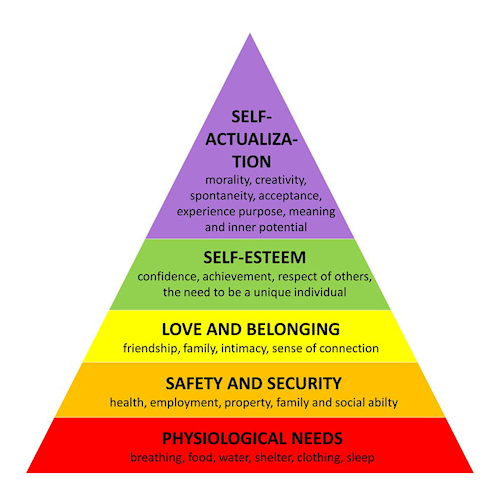All Posts in Category:Trauma
NPR's TED Radio Hour: Maslow's Human Needs share

A famous psychologist, Abraham Maslow created a well-known and researched model, a hierarchy, of basic human needs that impact our mental health. They are ordered from foundationally important basic needs to self-fulfillment needs: physiological needs, safety needs, love and belongingness needs, esteem needs, and, finally, self-actualization needs.
This interesting TED Radio Hour episode takes a dive into thinking about these basic needs in our modern times. Using people’s individual stories to illustrate each level of Maslow’s hierarchy. If you are interested in reading a more complete overview about the hierarchy, I encourage you to take a look at this easy to read article on Simple Psychology.
Maslow’s Human Needs
Humans need food, sleep, safety, love, purpose. Psychologist Abraham Maslow ordered our needs into a hierarchy. This week, TED speakers explore that spectrum of need, from primal to profound.
Life Stressors share
 Life stress can test and strain our normal coping skills. Sometimes the stress comes from normal life events like the loss of a parent, getting married, or changing jobs. Other times, the stress can come from the conflict we feel between living our lives by expressing the “true selves” we feel in our hearts and our fears that we will not be accepted by others for who we are. Chronic pain, the shadow of emotional trauma from past abuse, pressures that come from our complicated, modern lives…it all can get to be overwhelming.
Life stress can test and strain our normal coping skills. Sometimes the stress comes from normal life events like the loss of a parent, getting married, or changing jobs. Other times, the stress can come from the conflict we feel between living our lives by expressing the “true selves” we feel in our hearts and our fears that we will not be accepted by others for who we are. Chronic pain, the shadow of emotional trauma from past abuse, pressures that come from our complicated, modern lives…it all can get to be overwhelming.
As this site grows, you will find resources to help you better understand some of the struggles you are going through, to not feel so alone, and ideas for how you can move forward through the more challenging times in your life while reaching out to others, friends, and family (and/or therapist if you need) for support. Be sure to check out the How to Use This Site page to get you familiar with how resources are organized on the site. For those of you who would rather just jump in without an instruction manual, you can either search for key terms or move your mouse over Resource Index by Topic in the top menu bar and jump right in!



